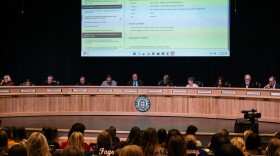Mayor Todd Gloria Thursday announced a pilot program that will use solar power to charge San Diego's municipal electric vehicle fleet as part of his climate action goal to cut the city's greenhouse gas emissions 50% by 2035.
The city is partnering with Sorrento Valley-based Beam Global to evaluate its Electric Vehicle Autonomous Renewable Charger for the next six months.
"This program allows the city to continue making progress on our Climate Action Plan while saving taxpayer dollars," Gloria said. "The EV ARC solar EV charging stations will allow the city to take advantage of San Diego's most plentiful natural resource and reduce emissions from city operations that harm human health and contribute to the climate crisis."
The EV ARC is designed to fit inside a 9x8 parking space and can fuel up to five vehicles at a time.
"This EV charging pilot program is a great first step to accelerate the adoption of electric vehicles into our city's fleet and make progress on our Climate Action Plan," said City Councilwoman Marni von Wilpert. "As the chair of the City Council's Active Transportation and Infrastructure Committee, I am focused on expanding the availability of EV charging infrastructure throughout our city, so that we reduce greenhouse gas emissions."
The pilot program is intended to contribute to one of the goals of the city's Climate Action Plan by reducing emissions from the city fleet. The plan sets targets of increasing the share of zero-emission vehicles in the municipal fleet to 90% by 2035. The city has 20 electric vehicles out of 4,000 in the fleet, or .5%.
"By choosing EV ARC systems, San Diego is demonstrating that it's possible to rapidly transition city fleets to EVs without disruptive and time- consuming construction or increased utility bills and with confidence that they can continue to charge during blackouts," said Desmond Wheatley, CEO of Beam Global. "Day or night, regardless of the conditions fleet operators can now charge and drive on sunshine."
The mayor's recently released proposed Fiscal Year 2002 budget includes funding for the city's first Mobility Action Plan — a multi-year effort intended to develop a data-driven identification-and-prioritization process for transportation projects and programs.
The proposed budget also calls for investing $5 million into the newly created Climate Equity Fund to help traditionally underserved communities "build a greener future."





